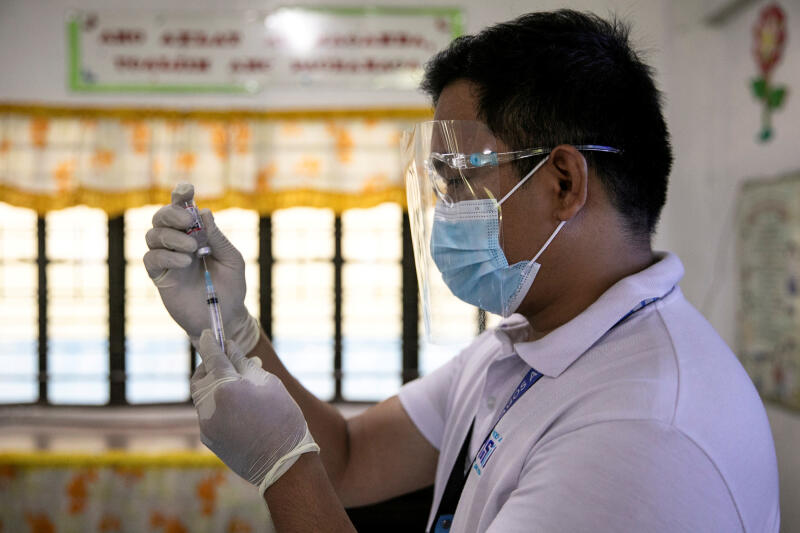Philippines kicks off vaccination drive with first shipment of Covid-19 vaccine from China
Sign up now: Get insights on Asia's fast-moving developments

A health worker participates in a simulation for Covid-19 vaccination in preparation for its arrival in Manila, on Feb 16, 2021.
PHOTO: REUTERS
Follow topic:
MANILA - Over 600,000 doses of a Covid-19 vaccine from China arrived in the Philippines on Sunday (Feb 28), finally enabling an immunisation programme that has been the last to kick off in South-east Asia.
President Rodrigo Duterte himself was at the airport to receive the shipment from Sinovac.
"We welcome this day with high hopes of finally ending the Covid-19 pandemic in our country," Mr Duterte said at an airbase, where crates containing Sinovac's vaccine were flown in by a Chinese military plane.
He said should conditions allow, he would like to travel to Beijing to personally thank China's President Xi Jinping.
"With the added layer of protection provided by the vaccines, we expect a significant decrease in active Covid-19 cases, leading to less stringent community quarantine restrictions, increased economic activity and a greater sense of normalcy in the lives of our people," Mr Carlito Galvez, the government's "vaccination czar", said at the event.
The Philippines is seeing a spike in Covid-19 infections, with over 2,000 cases tallied in recent days.
Mr Duterte earlier rejected his own pandemic task force's calls to further ease quarantine curbs to revive a stalled economy, unless the government could get a vaccine rollout going.
He said he was now reconsidering that decision.
The first doses would be given at six hospitals on Monday (March 1), with the country's top ministers already lined up to get their jabs.
Mr Galvez and Health Secretary Francisco Duque would be among those to receive the first jabs.
"This is to assure that all vaccines to be given to our citizens are safe and effective," said Mr Galvez.
However, most of the staff at the Philippine General Hospital, one of the six hospitals in the initial rollout, had opted to wait for a vaccine other than those coming from China.
"I signed up for Pfizer, so I'm going to wait for that," a nurse at the hospital told The Straits Times.
Mr Duterte will probably get his vaccination later as well, as Sinovac's vaccine is not recommended for people in his age group.
"It is up to the discretion of my doctor," Mr Duterte, who is 75 years old, told reporters.
The government had been under mounting pressure to begin doling out vaccines to its population of over 100 million, amid accusations that it bungled the procurement and delivery of doses.
While it has South-east Asia's second-biggest Covid-19 outbreak at more than half a million infections and over 10,000 deaths, the Philippines is the last nation in the region to begin an inoculation programme against Covid-19.
Mr Duterte's spokesman Harry Roque said this was not a big deal.
"It was just a matter of days," he said last Friday (Feb 26), referring to the delay.
The shipment from Sinovac and future deliveries from AstraZeneca and Pfizer-BioNTech, are unlikely to ease the Philippines' supply woes.
The government had been expecting 117,000 doses of the Pfizer-BioNTech vaccine and 5.5 million to 9.3 million doses of the AstraZeneca brand via the World Health Organisation's Covax facility.
But there are no firm dates yet for when these would arrive.
Pfizer has demanded an indemnity law before it ships doses to the Philippines to insulate it from class action suits or government inquiries that may arise from adverse effects with the use of its vaccine.
On Sunday, officials said an initial shipment of some 500,000 doses from AstraZeneca would no longer arrive, as earlier announced, on Monday (March 1).
Around 17 million more doses from AstraZeneca was negotiated by a private sector group, but those would not arrive till May or June.
Mr Duterte said the Philippines "will just have to wait until there is residual supply".
The government aims to secure 148 million doses to inoculate 70 million Filipinos this year, or two-thirds of the country's population. Some 40 million of those will come from Covax.
Mr Galvez said it probably would not be till the second half of the year before the bulk of those jabs arrive.

